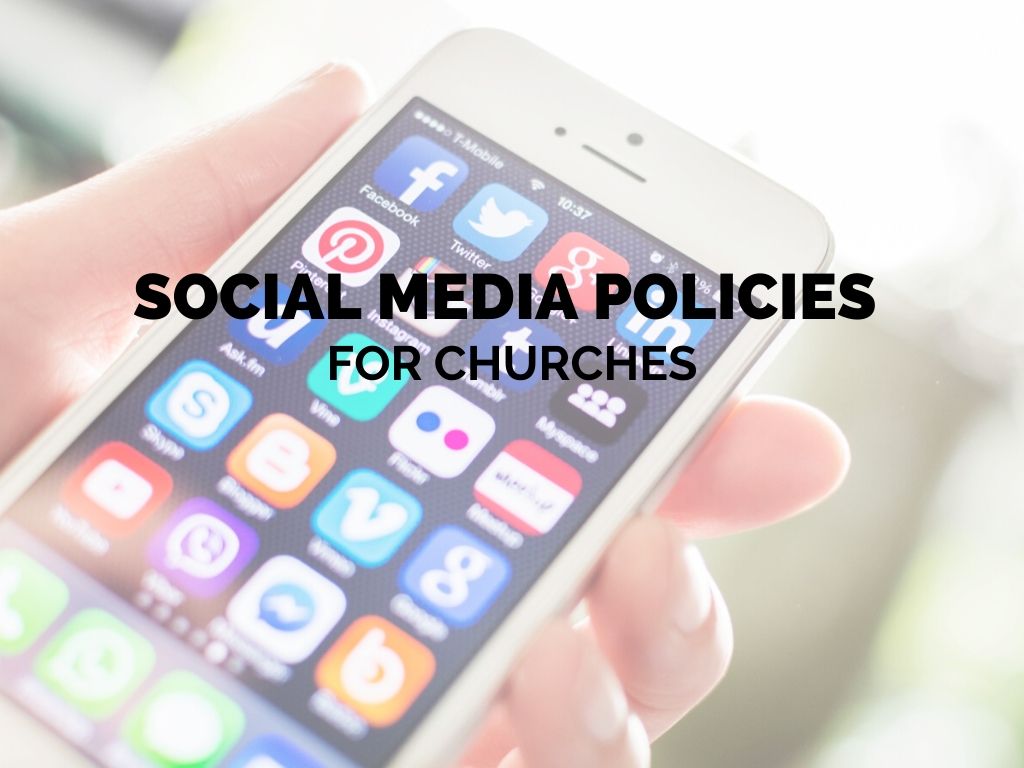Social media can be an excellent tool in ministry. With over 42% of the world’s population using social media, it’s a communication method that church leaders can’t afford to ignore. Like any tool, we can use social media for positive or negative purposes. As your church looks to leverage the influence of social media, it’s wise to develop a written social media policy to guide staff as they interact online.
What is a Social Media Policy?
A social media policy is an organization’s guidelines for how it’s employees should conduct themselves online – whether they’re posting as part of their job or as a private individual.
There are Two Key Sections to Include:
- Guidelines for how to conduct oneself on personal social media accounts and while interacting with people on church social media channels (Facebook Groups, etc.)
- Guidelines for how to manage the church’s social media accounts
Why Should Churches Have a Social Media Policy?
What employees post online reflects on the church (and, more importantly, on Christ) – even when they’re posting on their personal social media accounts. If a church staff member uses profane language or harasses someone online, that can negatively impact their ability to minister. Additionally, those actions damage the reputation of the church. If an employee engages in questionable online communication with minors, that endangers children, hurts the ministry of the church, and can cause long-term damage. By providing documented guidelines to all employees regarding the acceptable use of social media, you reduce the risk of serious issues down the road.
Section #1: Guidelines for Employees’ Use of Personal and Church-Sponsored Social Media
Include the following:
- Topic Guidelines
- If you wouldn’t be comfortable having a post shared in the church bulletin or on the front page of a newspaper, then don’t post it online.
- Don’t post about illegal drug use, excessive alcohol consumption, or sex.
- Avoid using profane or vulgar language in posts.
- Don’t share anything about upcoming events/news regarding the church unless it’s already been posted online by church communications or shared from the stage.
- Refrain from posting anything regarding an individual’s health, hospitalization, or other personal situations without that individual’s written permission.
- Don’t post specific prayer requests without the individual’s written permission.
- Take complex or sensitive discussions offline.
- Guidelines for Communicating with Minors on Social Media
- Rules for if/how to interact with minors on social media (including whether to accept or send “friend” requests to minors)
- When it is (or is not) appropriate to post photos of minors on social media channels
- Tagging (or not to tag) children on social media
- Parental Communication
- Provide guidelines about how and when to notify parents/guardians regarding how the church uses its social media channels to communicate with children. Invite parents to access these social media channels.
Section #2: Guidelines for staff who manage the church’s social media accounts
Include the following:
- Topic Guidelines
- Use the church’s social media channels to communicate about an upcoming sermon series or various church events, post links to audio/video of recent sermons, provide updates on the progress of various church programs or outreaches, share Bible verses or devotional materials.
- Keep posts relatable to all audiences (church members, visitors, non-Christians)
- Guidance on Monitoring Social Media Channels
- Offer a timeline for how quickly the church should respond to questions raised through social media.
- Provide guidelines on how to handle negative comments or heated discussions occurring on a church social media channel.
- Address how to deal with online harassment, threats to an individual’s safety, threats against the church, or accusations against the church.
- Clearly define what church leadership considers to be inappropriate content such as profanity, sexual content, excessive (or any, depending on your tradition) alcohol usage, illegal drug use, etc. Provide guidelines on what to do if someone posts inappropriate content on a church social media page.
- Determine whether your church’s social media managers will use a scheduling tool for upcoming posts. If so, make sure someone can quickly pause all upcoming posts if there’s an emergency or national/international situation that would make posting such items seem insensitive or unaware.
- Group Guidelines
- What types of Facebook Groups will the church create and administer?
- Who should administer each Group, and what are the rules for those individuals?
- What common rules will you use for every Group associated with your church? Consider including a policy on bullying, profanity, posting embarrassing content, etc.
- Preventing Copyright Infringement
- Include information about copyrights and how to ensure you don’t infringe on copyrights in a social media post.
- Mandatory Reporting of Child Abuse and Neglect
- Protecting children from online predators, abuse, or harassment is non-negotiable. As part of that effort, include clear instructions regarding what types of posts employees are responsible for reporting to church leadership and local law enforcement.
Examples of Church Social Media Policies and What to Include:
It’s much easier to write a policy when you have a few examples to review. Here are several examples to help you get started:
- The Ultimate List of Social Media Policies for Churches & Ministries – via SocialChurch.co
- Social Media Policy Sample Agreement – Brotherhood Mutual
- 5 Social Media & Email Guidelines for Church Staffs – Vanderbloemen
- Creating a Social Media Policy for Your Church – AG Financial Solutions
Before you finalize and review a social media policy with church staff, have an attorney take a look at it. You want to make sure the policy doesn’t contradict any applicable laws (and some laws, such as those related to mandatory reporting, vary by state).
It makes sense to leverage social media to attract and connect more people to Christ. A clear policy for employees is imperative to preserve the ability of your church and staff members to minister effectively. Never assume employees know what’s acceptable or not online. Provide clear, documented guidelines and enforce them consistently. This protects the church and your staff interacts online within the organization and the community.




